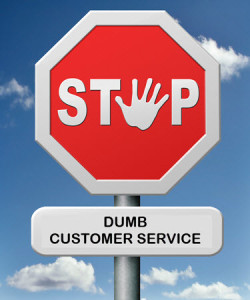The elusive, frustrating, and often missing element of our lives.
At times it feels like organizations do everything within their power to put barriers in the way of customer service.
Why is that?
Customer Service Barriers
A recent experience was like a race through the latest video game.
- The mission was to reach the reward
- Land mines and hurdles blocked the path
A charitable organization wanted to reward its long-time participants. The generous offer was for airfare and two-night hotel stays to this year’s event.
Cool, huh?
The three of us who qualified thought so, too. Until the barriers popped up.
We fly in the week before the event. We are business owners and we combine business with the charitable event.
The organization had an online sign-up form.
- One section had arrival and departure dates for airline reservations
- The earliest arrival date was the Saturday before the event
- I wanted the Thursday before
Request denied.
We’re talking the airline reservation. We’re not asking for extra hotel days.
We understand that we would pay for extra hotel days. But what is the problem with a different arrival date? Heck, it may even say them money.
How many times have you seen this kind of thing happen with customer service?
- Arbitrary rules place unintended (hopefully) barriers
- They can’t do that because they’ve always done this
When you dissect the RULE, you often find it’s based in some individual’s need for control.
Other times, customer service barriers are just plain dumb.
There is a simple 3-Part test to spot unintended barriers and dumb rules.
3-Part Customer Service Barrier-Busting Test
Before you place your next rule or stipulation, run it through the customer service barrier-busting test.
- What is your goal?
- Does your rule prevent reaching your goal?
- How can you change it to reach your goal?
Simple, right?
Using my customer service experience, let’s apply the test.
What is your goal?
I assume the goal was to reward long-time participants for their contributions.
Does your rule prevent reaching your goal?
At least in the case of the three of us, the answer to that was Yes.
How can you change it to reach your goal?
- Remove the restriction
- Change the sign-up form
- Allow participants to enter preferred arrival/departure dates
There may be some reason I am unaware of why the earlier date won’t work.
The barrier to the goal still exists.
So find another solution. Maybe offer a flat-dollar credit for travel.
There will always be some unforeseen barrier. That’s when you empower customer service.
- Let customer service know what your goal is
- Train representatives to achieve that goal
- Make it okay to use their judgment − even when you think they make a bad choice
Empowering customer service removes barriers to goals.
Good customer service is not as hard as we make it.
=================
Live…Laugh…Love

Yesterday I shopped at Costco… even in the heat we’re having it was a good experience. Costco is really clear on their mission – get folks to buy stuff by offering good deals. Part of that is paying their people a living wage… more, actually – in CA at least they start at $20 and hour. Their people want to help… and usually do. They are empowered to make decisions… what a concept.
This morning my son and I went to breakfast at a Denny’s that’s convenient for both of us… the person who was supposed to take the money went missing somehow… it took forever, it seemed, until someone else arrived to take our money… we walked out feeling ill treated.
Sigh… I don’t get it either, although control issues makes sense at Denny’s, but surley there is a way to maintain control (protect the cash) and not leave customers stranded.
Restaurants are a great example, Anne. The best ones I’ve experienced have staff serving customers – regardless if it’s “their” table or not. Staff fill water glasses, refill coffee mugs, pick up checks if they are walking by and see the customer is in need.
For me, that is a perfect example of putting the customer first and not sticking to the “rules” about whose section it is.
Thanks for sharing your stories, Anne.
Cathy, I’m reminded of every single “Everything on sale!” offer I’ve seen lately. It’s neither “everything” nor a “sale” if you read the fine print. The exclusions are longer to list than if they just said “These three things are on sale.” It’s frustrating, and it feels dishonest to say “everything” when you don’t really mean it. Every department store does this, as do some of the big box stores.
How about saying what you mean, like “Sale on select items!” I’d be much more inclined to forgive them if the thing I wanted wasn’t on sale. Hell, I’d even BUY it if I really wanted it instead of putting it back and waiting for a sale.
Good example, Lori. Sometimes you wonder how dumb they think we are. 😉